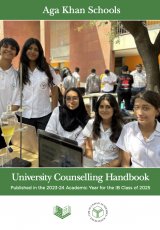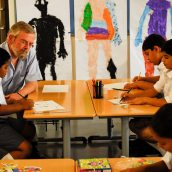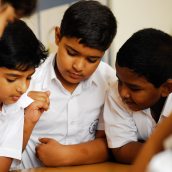Great Nations Need Great Schools
“If that can be achieved, almost everything else is irrelevant. But when a school begins, that can’t be taken for granted; it has to be created, and there are five identifiable components to that process of creation.”
The Faculty
Great teachers are the core of a great school more than any other factor, so the Academy focuses on recruiting and training great teachers. The Academy will eventually have a pupil:teacher ratio of about 9:1 at the end of the first phase of development, when it will have 750 pupils. The faculty will number roughly 85 teachers, most of whom will be Indian nationals. A permanent proportion from overseas will ensure the international mix of the educational experience on offer.
The Curriculum
Nurturing a child's innate curiosity and desire to learn is a crucial part of the Academies' educational programme.Achieving academic excellence across all areas of the curriculum is a key part of the Academies programme. Within that, one of the main objectives is to change the way children see their schooling. Far too much traditional teaching involves teachers standing reading out notes that the children write down, learn, and regurgitate in tests. That will not be the Academies’ approach. Instead, they believe in unlocking the inherent energy of young people through which they can develop the desire to learn and, in so doing, create a capacity and desire to achieve high standards, succeed at the best universities, and pursue any career of their choosing.“At the heart of this educational method lies child-centred learning and intelligent, interactive inquiry,” says Puddefoot. “Students find out for themselves how the world works, where they came from, how social and political systems operate, and why environmental issues matter. Show children how to educate themselves, and they will become life-long learners. Their motivation to learn will come from within themselves, and they will not need the carrot-and-stick approach of more traditional educational systems.”
The Facilities
Architecture is important to the Academies. “First we make our buildings and then our buildings make us,” is a view that leads the Academies to treasure the physical environment in which children develop, providing them with the space necessary for their intellectual, emotional, physical, and spiritual growth and maturation.
Built on a large campus to the east of Hyderabad International Airport, the Academy has an abundance of modern classrooms, laboratories, and visual and performing arts spaces. It will have residential accommodation for 300 students aged 12-18, with dorm parents maintaining a residential student-to-staff ratio of 8:1. The IT facilities will enable students to study with all the best modern resources at their disposal.
The purpose-built campus of the Aga Khan Academy, Hyderabad provides excellent facilities and an ideal setting for all aspects of learning and development.To emphasise the importance of physical fitness as well as intellectual rigour, the Academy will have extensive sports facilities, including an athletics track, cricket, soccer and hockey pitches, tennis and squash courts, two pools for swimming and diving, and a weights room. All this will be situated in landscaped grounds where students can walk and talk and think and relax when they are not in classes.The Students
Although academic excellence is a touchstone of the Academies’ educational provision, the children they are looking for will need other qualities besides mere intellectual ability.
“Exhibiting the potential to be a leader will be a defining characteristic of students entering the Academy, but this characteristic needs to be combined with other qualities, such as a concern to live for others, to treat education as a gift to be shared, not a possession to be hoarded, to treat talent as something given to us to enhance the lives of others, not merely to feather our own nests. There is a strong emphasis on stewardship, on taking what others have generously provided, often at great cost, using those resources responsibly for the good of humankind, and handing them on improved and enhanced to later generations.”
Puddefoot feels that leadership can and should be taught. “It is certainly true that instilling a sense of our responsibility to others runs counter to much of the consumerism of modern culture,” he says, “but what we have on our side is the idealism and strength of belief many young people have, and their ambition to make the world a better place.”
The Parents
Education is a partnership between families and schools. The Academies encourage parents who are passionate about education to support their vision, and actively help them to see that traditional methods in education and many of the objectives and values that have sometimes driven it are neither necessary nor productive.
Students are able to share and enhance their learning through collaborative work.“Our parents tend to see education at school only as a beginning, and not an end. They will see the necessary examination results that will take their children into a university only as a beginning, and the personal skills and balanced lifestyle that will accompany them through the rest of their careers as far more important in the longer term. They understand what the Academies are doing and support us in it.”The Heart of a Great School
“If you asked me to summarise what I think lies at the heart of a great school, I think I’d say that a great school inculcates in its students a frame of mind, a resilience and confidence,” concludes John Puddefoot.
“It is not the degree of conformity to what they are taught, or the readiness with which they learn what they are told to learn, that will ultimately be the measure of a person. It is the courage they show in refusing to believe what they are told to believe, the determination they show to achieve what they are told they cannot achieve, and the speed and frequency with which they lift themselves from every setback and knock-down to rise and fight again. That will be the measure of any human being.
“Produce such men and you cannot but have provided a good education; produce such women and you cannot but have created a great school; produce such people and, even if they will not be the easiest children to teach or the most compliant citizens to govern, you cannot but have the makings of a great nation.
“That is why great nations need great schools.”
John Puddefoot is a graduate of Oxford University in mathematics, and of Edinburgh University in philosophical theology. He was previously at Eton College in the UK for 25 years as a mathematics master, head of mathematics and Deputy Head (Curriculum). He was then Warden of S. Thomas’ College, Mount Lavinia, in Sri Lanka. He became the Head of the Aga Khan Academy, Hyderabad when it opened in 2011.
publications







